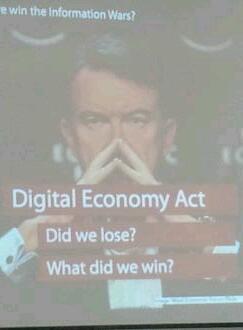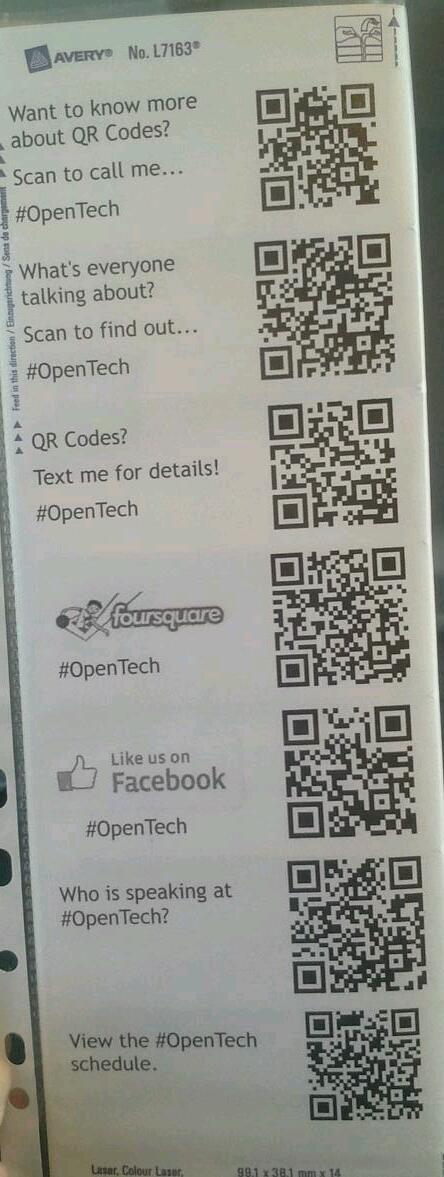Another year, another OpenTech. I found last year's OpenTech conference to be awe-inspiring. This year's was equally good.
This is a quick rundown of the sessions I attended that I found particularly interesting.
How can we win the Information Wars?
A roundup of what the Open Rights Group has been doing over the last year.
 Always good to hear from them. Interesting to learn about the tensions of being up against a company for some issues - yet supporting them in others. Good to see that they're still banging away at the digital civil liberties drum.
Always good to hear from them. Interesting to learn about the tensions of being up against a company for some issues - yet supporting them in others. Good to see that they're still banging away at the digital civil liberties drum.
Ada Lovelace Day
Once again, Suw eloquently demonstrated the need to get more women interested in "tech" by promoting positive role models. The Finding Ada project runs an international event to help raise the profile of women in science, technology, engineering and maths.
Codifying sustainability
How can you trust what you read in a report?
The UN panel on climate change warning that Himalayan glaciers could melt to a fifth of current levels by 2035 is wildly inaccurate, an academic says.
J Graham Cogley, a professor at Ontario Trent University, says he believes the UN authors got the date from an earlier report wrong by more than 300 years.
He is astonished they "misread 2350 as 2035".
In the "good old days" we relied on footnotes which, imperfectly, lead us to the original research.
The AMEE project aims to provide an unimpeachable set of references for every claim - allowing you to track the providence of a quote, statistic, or datum. Vitally important.
Building Digital Culture for Free: Can the Hacker Ethic and Comons-Based Peer Production make a better world?
Bill Thompson is always an entertaining speaker. Here, he was discussing whether "hackers" have won the culture wars. You can buy The Hacker Ethic on Amazon (including Kindle). Very reasonably priced.
This raised two interesting questions.
- How many deaths were caused by Gutenberg and, ultimately, did his invention help propagate his world view? In other words, is Open Source being turned against us?
- Are our inventions too disruptive to find acceptance in the mainstream?
At times, the questions started to get a bit political - especially around the true definition of Open Source.


Fluffy and poisonous - Why UKuncut has worked and how you can help.
I've been reasonably impressed at how quickly UKuncut has gathered grass-roots support around what is, potentiall, a dull subject - tax avoidance. I doubt the trades-union would have been able to garner anything like the support we've seen for UKuncut.
But I question whether they have been all that effective. Vodafone's share price has risen dramatically and they are constantly among the top UK brands.


(As I stated at the start of my question, I'm an ex-Vodafone employee and a current Vodafone shareholder.)
The answer I got back was well thought out and - to my mind - very helpful in understanding their aims.


Essentially, causing mass economic disruption to a company isn't a great way to make them change their behaviour and is very tricky to accomplish in the long term. UKuncut are playing the long-game with a meme. Essentially, going around saying "Don't you think she looks tired?"
Watching the Press


 I especially liked the demolition of the Winterval Myth
I especially liked the demolition of the Winterval Myth
Outpost
This was Tim Ireland's idea to crowd-source fact-monitor all MPs. A fine and noble idea and very well presented.
My only concern is that it avoids becoming partisan. I don't care if Politician X is a socialist, capitalist, atheist, or church-goer. They shouldn't be attacked for that. They should be held to account for any dodgy-dealing, fact free agitating, and dishonest conduct. It'll be interesting to see how it develops.
QR Codes - easy access to data
My slot! Prior to the event, I was interviewed by Imperica. I spent the first half of the day sticking Avery labels with QR codes all over the building.

Video
Slides
https://www.slideshare.net/slideshow/qr-codes-at-opentech-2011/8054740
Reaction
I'll let other people commentate on my presentation.








Overall
An amazing and inspiring day. The entry cost per participant was £5. I've paid a lot more for worse conferences. I was glad to see so many civil servants there - hopefully they're getting the message.
I'll leave the final words to James Cattell. This sums up exactly what OpenTech is all about.



One thought on “OpenTech 2011”
@edent Bizarrely, my blog got a pingback notification this morning, from your May 2011 post - so, belatedly, thank you!
shkspr.mobi/blog/2011/05/o…
| Reply to original comment on twitter.com
What links here from around this blog?